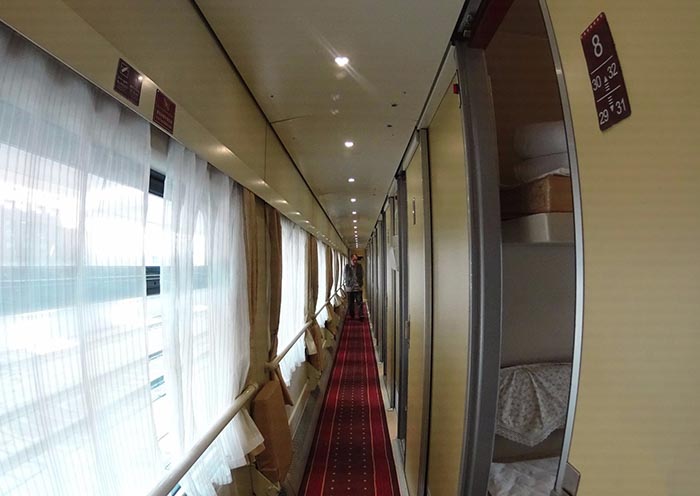Accommodation:Overnight in Xining
After your visit to Qinghai Lake, that afternoon we will drive back to Xining and transfer you to the Xining train station to board your overnight train to Lhasa, Tibet.
Accommodation:Overnight on the train
Tips for High Altitude Acclimatization:
1) Go for a leisurely walk in the fresh high altitude air, but avoid any strenuous activity after your arrival.
2) It's better to avoid taking a bath to avoid catching a cold.
3) Drink plenty of water to avoid dehydration, and eat some fresh fruit.
4) Get plenty of rest.
Accommodation:Overnight in Lhasa
From one historic landmark to another, your next stop will be at the Jokhang Temple, considered as the spiritual heart of Tibetan Buddhism. Every day thousands of pilgrims come from all over Tibet and other places to the temple to worship the Buddha. The Jokhang Temple is also known as the "House of Buddha" because it houses the precious Jowo Rinpoche, a life-sized (1.5 meter/5 feet) image of the Sakyamuni at the age of 12.
The last stop for today's Lhasa exploration is Barkhor Street, the wide, circular street that surrounds the Jokhang Temple. Local residents enjoy walking on the street, completing several circuits known as “kora" around the temple as a daily tradition of pilgrimage. The street also has many small shops selling a wide variety of traditional Tibetan goods, religious items and handicrafts.
Tips for today's tour:
1) There are 1,080 steps to the top of the Potala Palace, so it's best to take it slowly to avoid high altitude sickness.
2) Taking photos is not allowed inside the Potala Palace.
3) Most of today will be spent outside, so please bring a hat, sunscreen, sunglasses and some water with you to protect yourself from the more intense sun at the higher altitude.
Accommodation:Overnight in Lhasa
After visiting the palaces and park at Norbulingka, we will travel around 5 kilometers to the western outskirts of Lhasa to visit the Drepung Monastery. The word "drepung" in Tibetan language means "prosperity". Since its establishment in 1416, Drepung Monastery has served as one of the most important Buddhist monasteries in Tibet. During its prime, more than 10,000 monks lived and studied in the monastery. Throughout its history, many important and famous Tibetan leaders studied at this monastery, including the Dalai Lamas. Accordingly, Drepung Monastery is also respectfully known as the “Mother School of Dalai Lamas”.
In the afternoon, we will escort you on to another famous monastery in Lhasa - the Sera Monastery. Sera Monastery is famous for its spectacular “Buddhist Debates”. As a daily routine, the monks gather in a courtyard, and debate on the various Buddhist doctrines with exaggerated gestures, which is thought to be helpful in facilitating a better comprehension of the Buddhist philosophy to attain higher levels of study. After enjoying the "Buddhist Debates", we will take you back to your hotel with the rest of the day and evening to relax or explore on your own.
Tips for Proper Etiquette While Visiting Monasteries
1) For clothing, shorts and/or bare shoulders are not allowed.
2) Hats and sunglasses should be removed before entering the chapels.
3) Taking photos is usually not allowed inside the chapels.
Accommodation:Overnight in Lhasa
Accommodation:Overnight in Dangxiong
For lunch we will stop in Damxung, located about 160 kilometers from Lhasa in the middle of Tibet and considered the gateway to the Tibetan capital. After lunch we will journey on to the Yangpachen Hot Spring, where there are both indoor and outdoor swimming pools filled with geothermal hot spring water. We will then travel on back to Lhasa and check in to your hotel for the overnight stay.
Accommodation:Overnight in Lhasa
Today's Tips:
1) Please take care to pack all of your belongings, particularly the small things that are easy to forget about, such as phone and camera chargers, power adapters, mobile phones, wallets, etc.
2) If your flight or train is in the afternoon, please be sure to check out of your hotel room by 12 p.m.
Accommodation:None










































 Data in submission...
Data in submission...